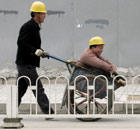BizViews
Fortifying gains of growth
By JIA KANG (China Daily)
Updated: 2010-03-20 16:21
 |
Large Medium Small |
Economic restructuring through enhanced means and sound policy-oriented finance will prevent inflation
President Hu Jintao has called on the entire nation to expedite economic restructuring and make it a strategic focus for the adjustment of the development pattern. The country has seen a turnaround in macro-economy. But it is important to optimize economic restructuring in order to consolidate macro-economic regulation, transform the economic development pattern and realize long-term stable and rapid economic growth.
This is a good time to optimize economic restructuring, because deflation fears have faded away and inflation worries are in the nascent stage. As the economy entered the turnaround phase last year, the principal aspect of contradiction in macro-control shifted from insufficient domestic demand to structural restrictions. And the structural problems of excess capacity, extensive development and low-level redundant construction have become deep-seated factors constraining long-term development.
Efforts to guide investment, consumption and income distribution should correspond with economic structural adjustment. The government's 4-trillion-yuan ($586 billion) stimulus package, which would continue to be used this year, is aimed at optimizing the adjustment of economic restructuring. Investments in infrastructure, post-natural disaster reconstruction, new countryside constructions, housing projects for low-income urban families, environmental protection programs, and creative and innovative ventures could boost economic restructuring, as well as increase domestic demand.
As a key component of restructuring, the essence of industrial structure optimization is to eliminate backward and excess capacity and promote upgrading, in which economic means should get priority.
Experience shows that the government is not necessarily aware of all the truths in economic operation and it usually only sets directions. The major role of law is to safeguard and protect the rules and environment under which enterprises can compete fairly.
In fact, to promote structural optimization one often only needs government orientation and a legal framework along with standardized design and implementation of economic levers. For example, the government first announces a series of targeted tax incentives or subsidies as part of its policies and then lets enterprises optimize resource allocation in market competition.
Taxation is an important instrument, based on rule of law, and we need to make the best use of resources tax, consumption tax and environmental tax to eliminate backward capacity and optimize economic restructuring.
The development of policy-oriented financing could play an important role in economic restructuring. But despite having made considerable progress since the reform and opening up, the country's financial system needs more institutional and managerial innovation.
In a market economy, we cannot expect the commercial financial system to directly promote optimization of economic restructuring. Banks and financial institutions can at best support projects and sectors with the most obvious benefits and least risks - a market-based mechanism for optimal allocation of resources - because of the constraints placed by the central bank on the amounts they can spend on such projects and the risks involved.
China has to establish a reasonable policy-oriented financial system because large funds are needed for post-earthquake reconstruction in Sichuan province, survival and development of small and medium-sized enterprises (SMEs) that were battered by the global financial crisis, projects for agriculture, rural areas and farmers, and other areas.
A sound policy-oriented financial system would require the establishment and operation of special policy-oriented financial institutions. It will also need selected commercial financial institutions engaged in services through bidding, especially the coordination and linkage mechanism between the objects (including SMEs, rural and agricultural projects) to be supported, and banks, policy-oriented financial institutions and related fiscal sectors to minimize risks and enhance the performance of credit.
The author is director of the Institute for Fiscal Science Research under the Ministry of Finance.














